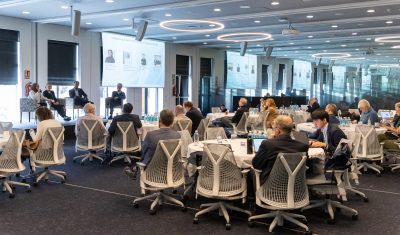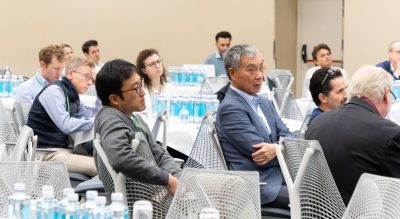
On 12 November 2025, BSC’s Fusion Group participated in a high-level panel discussion at the Cleantech Forum Europe 2025 in Sitges, Spain. The session, titled “Integrating Fusion into the EU Energy Roadmap,” brought together leading voices from research, industry, and policy to discuss Europe’s evolving role in the global fusion energy landscape.
The panel was moderated by Zainab Gilani (Cleantech Group) and included Mervi Mantsinen (Barcelona Supercomputing Center), Richard Kembleton (Gauss Fusion), and Pierre-Yves Chaffard (Fusion for Energy).
Strong interest in fusion across the cleantech community
Fusion attracted significant attention among Forum participants, many of whom come from the energy, climate tech, industrial manufacturing, and investment communities. This reflects a clear trend: fusion is increasingly recognised not only as a long-term clean energy solution, but as an important driver for innovation across materials science, manufacturing, computing, and AI.

Topics of discussion: Europe’s strengths and emerging opportunities
The panel explored several key themes:
1) Europe’s unique position in fusion
Europe benefits from a rare combination of strengths:
- Decades of world-leading research at facilities such as JET, ASDEX Upgrade, and Wendelstein 7-X
- The world’s largest collaborative fusion project, ITER, with a highly capable industrial supply chain
- A growing ecosystem of private fusion companies such as Gauss Fusion and Renaissance Fusion
- A coordinated research framework via EUROfusion, supported by advanced computing infrastructures like EuroHPC
This places Europe in a strong position to shape the future of fusion energy — provided that scientific, industrial, and investment communities work hand in hand.
2) Digital acceleration: HPC, AI and multiphysics simulations
A central point of the discussion was the accelerating role of high-performance computing (HPC), AI, and multiphysics modelling in advancing fusion research.
Dr. Mantsinen highlighted that modern fusion development is increasingly a digital engineering challenge:
- AI-assisted plasma control is already being tested at existing tokamaks to predict and mitigate instabilities.
- Machine learning is accelerating analysis of large experimental datasets and helping optimise heating scenarios.
- Digital twins are emerging as a pathway to test reactor designs, optimise performance, and reduce the cost and risk of future demonstration plants.
- Advanced simulations allow scientists to model plasma behaviour, energetic particle dynamics, and material responses under extreme conditions before experimental execution.
These capabilities significantly shorten development cycles and help de-risk future large-scale projects such as ITER and DEMO.
3) Key challenges and the role of enabling technologies
The panel also discussed cross-cutting challenges that require collaboration beyond the fusion community:
- High-temperature superconductors (HTS) for compact high-field magnets
- Advanced materials to withstand neutron loads and heat fluxes
- Manufacturing innovation, including precision machining, robotics, and additive manufacturing
- Long-term investment models suited to complex, multi-decadal energy technologies
These enabling technologies represent significant opportunities for European industry and investors over the coming years.
4) Collaboration across disciplines and sectors
All panelists emphasized that the next phase of fusion development depends on strong collaboration:
- Between research institutions and private companies
- Across computing, materials science, and engineering
- Between European and global partners
At BSC, the Fusion Group contributes to this through the EUROfusion Advanced Computing Hub, the FusionCAT project, and active collaborations with ITER and other international programmes.

Looking ahead
The enthusiastic response from Cleantech Forum participants indicates a growing recognition that fusion is not only a scientific challenge, but a broader innovation ecosystem where Europe can lead globally, combining scientific excellence with industrial capability and advanced digital infrastructure.
We thank Cleantech Group for the invitation and for creating a platform that brings fusion into the wider cleantech dialogue. We look forward to continued collaboration with European and international partners as fusion moves closer to becoming a scalable, reliable energy source for the future.
